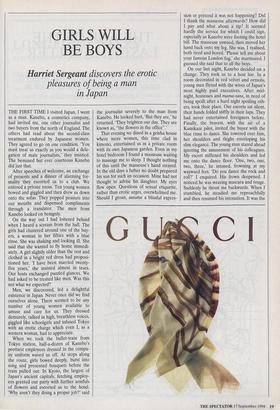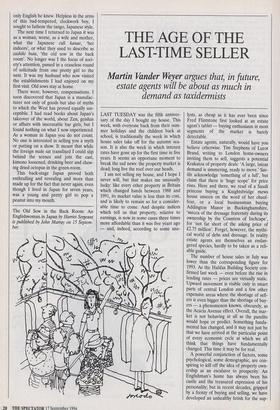GIRLS WILL BE BOYS
Harriet Sergeant discovers the erotic
pleasures of being a man in Japan
THE FIRST TIME I visited Japan, I went as a man. Kanebo, a cosmetics company, had invited me, one other journalist and two buyers from the north of England. The others had read about the second-class treatment endured by Japanese women. They agreed to go on one condition. 'You must treat us exactly as you would a dele- gation of male journalists,' they insisted. The bemused but ever courteous Kanebo did just that.
After speeches of welcome, an exchange of presents and a dinner of alarming for- mality they escorted us to a club. We entered a private room. Ten young women bowed and giggled and then drew us down onto the sofas. They popped peanuts into our mouths and dispensed compliments through a translator. The men from Kanebo looked on benignly.
On the way out I had loitered behind when I heard a scream from the hall. The girls had clustered around one of the buy- ers, a woman in her fifties with a blue rinse. She was shaking and looking ill. She said that she wanted to fly home immedi- ately. A girl slightly older than the rest and clothed in a bright red dress had proposi- tioned her. 'I have been married twenty- five years,' she insisted almost in tears. Our hosts exchanged puzzled glances. We had asked to be treated like men. Was this not what we expected? Men, we discovered, led a delightful existence in Japan. Never once did we find ourselves alone. There seemed to be any number of young women available to amuse and care for us. They dressed demurely, talked in high, breathless voices, giggled like schoolgirls and infused Tokyo with an erotic charge which even I, as a western woman, had to appreciate.
When we took the bullet-train from Tokyo station, half-a-dozen of Kanebo's prettiest employees dressed in the compa- ny uniform waved us off. At stops along the route, girls bowed deeply, burst into song and presented bouquets before the train pulled out. In Kyoto, the largest of Japan's ancient capitals, fetching employ- ees greeted our party with further armfuls of flowers and escorted us to the hotel. `Why aren't they doing a proper job?' said the journalist severely to the man from Kanebo. He looked hurt, Tut they are,' he returned. 'They brighten our day. They are known as, "the flowers in the office".'
That evening we dined in a geisha house where more women, this time clad in kimono, entertained us in a private room with its own Japanese garden. Even in my hotel bedroom I found a masseuse waiting to massage me to sleep. I thought nothing of this until the masseuse's hand strayed. In the old days a father no doubt prepared his son for such an occasion. Mine had not thought to advise his daughter. My eyes flew open. Questions of sexual etiquette, rather than erotic urges, overwhelmed me. Should I groan, assume a blissful expres- sion or pretend it was not happening? Did I thank the masseuse afterwards? How did I pay and what about a tip? It seemed hardly the service for which I could sign, especially as Kanebo were footing the hotel bill. The masseuse yawned, then moved her hand back onto my leg. She was, I realised, both tired and bored. 'Please tell me about your famous London fog,' she murmured. I guessed she said that to all the boys.
On our last night, Kanebo decided on a change. They took us to a host bar. In a room decorated in red velvet and ormolu, young men flirted with the wives of Japan's most highly paid executives. After mid- night, hostesses and mama-sans, in need of being spoilt after a hard night spoiling oth- ers, took their place. Our escorts sat silent, their hands folded stiffly in their laps. They had never entertained foreigners before. Finally, the bravest, with the air of a Kamikaze pilot, invited the buyer with the blue rinse to dance. She towered over him, her shoulders and thighs enveloping his slim elegance. The young man stared ahead ignoring the amusement of his colleagues. My escort stiffened his shoulders and led me onto the dance floor. 'One, two, one, two, three,' he intoned, frowning at my wayward feet. 'Do you dance the rock and roll?' I enquired. His frown deepened. I noticed he was wearing mascara and rouge. Suddenly he thrust me backwards. When I stumbled, he steadied me reproachfully and then resumed his intonation. It was the
only English he knew. Helpless in the arms of this bad-tempered, clockwork boy, I sought to fathom the tango, Japanese style.
The next time I returned to Japan it was as a woman, worse, as a wife and mother, what the Japanese call kanae, ter indoors', or what they used to describe as zashiki buta, 'the old sow in the back room'. No longer was I the focus of soci- ety's attention, passed in a ceaseless round of solicitude from one pretty girl to the next. It was my husband who now visited the establishments I had enjoyed on my first visit. Old sows stay at home.
There were, however, compensations. I soon discovered that Japan is a manufac- turer not only of goods but also of myths to which the West has proved equally sus- ceptible. I had read books about Japan's takeover of the world, about Zen, geishas or affairs with inscrutable bar girls, but I found nothing on what I now experienced. As a woman in Japan you do not count. No one is interested in selling you a myth or putting on a show. It meant that while the foreign male sat transfixed 1 could slip behind the scenes and join the cast, kimono loosened, drinking beer and chew- ing dried octopus in the green-room.
This back-stage Japan proved both enthralling and revealing and more than made up for the fact that never again, even though I lived in Japan for seven years, was a young and pretty girl to pop a peanut into my mouth.
The Old Sow in the Back Room: An Englishwoman.in Japan by Harriet Sergeant is published by John Murray on 15 Septem- ber.



























































 Previous page
Previous page